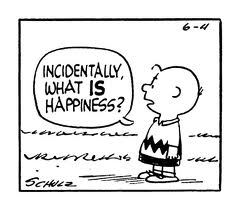 Not so long ago I wrote a blog on the New Atheist bus campaign which extolled the virtues of not worrying about God and getting on being happy in life. It presumed not only the absence of God, but that in the meantime all believers were a pretty glum, worrisome group. Indeed anyone taking a brief look at the popular media could be forgiven for seeing believers as a bunch of hectoring malcontents, who are only really happy when they’re being miserable. The reality, it would appear, is quite different.
Not so long ago I wrote a blog on the New Atheist bus campaign which extolled the virtues of not worrying about God and getting on being happy in life. It presumed not only the absence of God, but that in the meantime all believers were a pretty glum, worrisome group. Indeed anyone taking a brief look at the popular media could be forgiven for seeing believers as a bunch of hectoring malcontents, who are only really happy when they’re being miserable. The reality, it would appear, is quite different.
An article by Mark Vernon in this week’s Tablet looks at recent studies in the science of happiness. Drawing on the work of psychologists, like Martin Seligman in the US, it argues that being actively religious “means you are less likely to commit crime, get divorced, commit suicide or suffer from depression.” You are also more likely to be healthier and live longer. In Seligman’s 2005 book, Happiness: Lessons from a New Science, he presented evidence that having no faith had a more detrimental impact on happiness than losing a job, though not quite as bad as being widowed.
 Reasons for a correlation between life, faith and happiness vary. Vernon points to the moral weight and behaviour demanded by world religions. Going beyond the Commandments of the Old Testament we are offered a new vision of humanity by Christ. One that is based on forgiveness, understanding and compassion. In many respects such values seem counter intuitive, but throughout history the reckless love of Christ extended to all has been a movement that has been repeatedly vindicated. I feel this to be especially true in relation to the work of peace and reconciliation in our world today. People in movements in South Africa and Northern Ireland who have offered the other cheek, who have stood up to oppression and who have stood for forgiveness have seemed naive at best and deluded at worst, but have consistently triumphed over bigotry and hatred.
Reasons for a correlation between life, faith and happiness vary. Vernon points to the moral weight and behaviour demanded by world religions. Going beyond the Commandments of the Old Testament we are offered a new vision of humanity by Christ. One that is based on forgiveness, understanding and compassion. In many respects such values seem counter intuitive, but throughout history the reckless love of Christ extended to all has been a movement that has been repeatedly vindicated. I feel this to be especially true in relation to the work of peace and reconciliation in our world today. People in movements in South Africa and Northern Ireland who have offered the other cheek, who have stood up to oppression and who have stood for forgiveness have seemed naive at best and deluded at worst, but have consistently triumphed over bigotry and hatred.
The other important aspect of faith is community. Alain de Botton, one of the New Atheists, in his most recent work points to the role of faith and church in social cohesiveness. Simply put our faith binds us together. Wherever we go we are part of a group of over a billion people who profess the same faith, regardless of location, ethnicity, gender or whatever. We stand as a community of faith and as a family of believers. Today in a world where finding your place is of key importance our faith provides that central need. We belong. Together.
 In its essence perhaps this is what happiness is: knowing that we are part of something; being invited to live a life that sees the best in others and in ourselves; and being bound together in the love of our Father. What else could you want?
In its essence perhaps this is what happiness is: knowing that we are part of something; being invited to live a life that sees the best in others and in ourselves; and being bound together in the love of our Father. What else could you want?